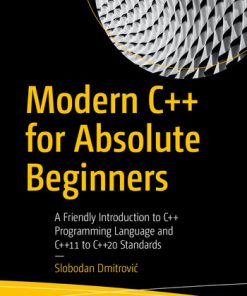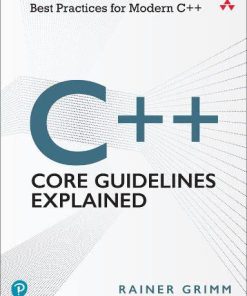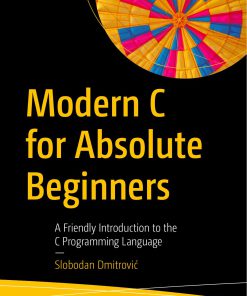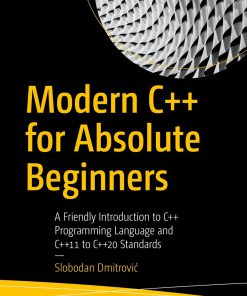Modern C 1st Edition by Jens Gustedt 1638350651 9781638350651
$50.00 Original price was: $50.00.$25.00Current price is: $25.00.
Modern C 1st Edition by Jens Gustedt – Ebook PDF Instant Download/DeliveryISBN: 1638350651, 9781638350651
Full download Modern C 1st Edition after payment.

Product details:
ISBN-10 : 1638350651
ISBN-13 : 9781638350651
Author: Jens Gustedt
Summary Modern C focuses on the new and unique features of modern C programming. The book is based on the latest C standards and offers an up-to-date perspective on this tried-and-true language. About the technology C is extraordinarily modern for a 50-year-old programming language. Whether you’re writing embedded code, low-level system routines, or high-performance applications, C is up to the challenge. This unique book, based on the latest C standards, exposes a modern perspective of this tried-and-true language. About the book Modern C introduces you to modern day C programming, emphasizing the unique and new features of this powerful language. For new C coders, it starts with fundamentals like structure, grammar, compilation, and execution. From there, you’ll advance to control structures, data types, operators, and functions, as you gain a deeper understanding of what’s happening under the hood. In the final chapters, you’ll explore performance considerations, reentrancy, atomicity, threads, and type-generic programming. You’ll code as you go with concept-reinforcing exercises and skill-honing challenges along the way. What’s inside Operators and functions Pointers, threading, and atomicity C’s memory model Hands-on exercises About the reader For programmers comfortable writing simple programs in a language like Java, Python, Ruby, C#, C++, or C. About the author Jens Gustedt is a senior scientist at the French National Institute for Computer Science and Control (INRIA) and co-editor of the ISO C standard.
Modern C 1st Table of contents:
Chapter 1. Getting started
1.1. Imperative programming
1.2. Compiling and running
Summary
Chapter 2. The principal structure of a program
2.1. Grammar
2.2. Declarations
2.3. Definitions
2.4. Statements
2.4.1. Iteration
2.4.2. Function calls
2.4.3. Function return
Summary
Level 1. Acquaintance
Buckle up
Chapter 3. Everything is about control
3.1. Conditional execution
3.2. Iterations
3.3. Multiple selection
Summary
Chapter 4. Expressing computations
4.1. Arithmetic
4.1.1. +, -, and *
4.1.2. Division and remainder
4.2. Operators that modify objects
4.3. Boolean context
4.3.1. Comparison
4.3.2. Logic
4.4. The ternary or conditional operator
4.5. Evaluation order
Summary
Chapter 5. Basic values and data
5.1. The abstract state machine
5.1.1. Values
5.1.2. Types
5.1.3. Binary representation and the abstract state machine
5.1.4. Optimization
5.2. Basic types
5.3. Specifying values
5.3.1. Complex constants
5.4. Implicit conversions
5.5. Initializers
5.6. Named constants
5.6.1. Read-only objects
5.6.2. Enumerations
5.6.3. Macros
5.6.4. Compound literals
5.7. Binary representions
5.7.1. Unsigned integers
5.7.2. Bit sets and bitwise operators
5.7.3. Shift operators
5.7.4. Boolean values
5.7.5. Signed integers
5.7.6. Fixed-width integer types
5.7.7. Floating-point data
Summary
Chapter 6. Derived data types
6.1. Arrays
6.1.1. Array declaration
6.1.2. Array operations
6.1.3. Array length
6.1.4. Arrays as parameters
6.1.5. Strings are special
6.2. Pointers as opaque types
6.3. Structures
6.4. New names for types: type aliases
Summary
Chapter 7. Functions
7.1. Simple functions
7.2. main is special
7.3. Recursion
Summary
Chapter 8. C library functions
8.1. General properties of the C library and its functions
8.1.1. Headers
8.1.2. Interfaces
8.1.3. Error checking
8.1.4. Bounds-checking interfaces
8.1.5. Platform preconditions
8.2. Mathematics
8.3. Input, output, and file manipulation
8.3.1. Unformatted text output
8.3.2. Files and streams
8.3.3. Text IO
8.3.4. Formatted output
8.3.5. Unformatted text input
8.4. String processing and conversion
8.5. Time
8.6. Runtime environment settings
8.7. Program termination and assertions
Summary
Level 2. Cognition
Chapter 9. Style
9.1. Formatting
9.2. Naming
Summary
Chapter 10. Organization and documentation
10.1. Interface documentation
10.2. Implementation
10.2.1. Macros
10.2.2. Pure functions
Summary
Chapter 11. Pointers
11.1. Pointer operations
11.1.1. Address-of and object-of operators
11.1.2. Pointer addition
11.1.3. Pointer subtraction and difference
11.1.4. Pointer validity
11.1.5. Null pointers
11.2. Pointers and structures
11.3. Pointers and arrays
11.3.1. Array and pointer access are the same
11.3.2. Array and pointer parameters are the same
11.4. Function pointers
Summary
Chapter 12. The C memory model
12.1. A uniform memory model
12.2. Unions
12.3. Memory and state
12.4. Pointers to unspecific objects
12.5. Explicit conversions
12.6. Effective types
12.7. Alignment
Summary
Chapter 13. Storage
13.1. malloc and friends
13.1.1. A complete example with varying array size
13.1.2. Ensuring consistency of dynamic allocations
13.2. Storage duration, lifetime, and visibility
13.2.1. Static storage duration
13.2.2. Automatic storage duration
13.3. Digression: using objects “before” their definition
13.4. Initialization
13.5. Digression: a machine model
Summary
Chapter 14. More involved processing and IO
14.1. Text processing
14.2. Formatted input
14.3. Extended character sets
14.4. Binary streams
14.5. Error checking and cleanup
Summary
Level 3. Experience
Chapter 15. Performance
15.1. Inline functions
15.2. Using restrict qualifiers
15.3. Measurement and inspection
Summary
Chapter 16. Function-like macros
16.1. How function-like macros work
16.2. Argument checking
16.3. Accessing the calling context
16.4. Default arguments
16.5. Variable-length argument lists
16.5.1. Variadic macros
16.5.2. A detour: variadic functions
16.6. Type-generic programming
Summary
Chapter 17. Variations in control flow
17.1. A complicated example
17.2. Sequencing
17.3. Short jumps
17.4. Functions
17.5. Long jumps
17.6. Signal handlers
Summary
Chapter 18. Threads
18.1. Simple inter-thread control
18.2. Race-free initialization and destruction
18.3. Thread-local data
18.4. Critical data and critical sections
18.5. Communicating through condition variables
18.6. More sophisticated thread management
Summary
Chapter 19. Atomic access and memory consistency
19.1. The “happened before” relation
19.2. C library calls that provide synchronization
19.3. Sequential consistency
19.4. Other consistency models
People also search for Modern C 1st:
rummy modern
mid century modern
tate modern
call of duty modern warfare
simple modern
Tags: Modern, Jens Gustedt, unique features, C standards, date perspective
You may also like…
Computers - Programming
Computers - Programming
Effective Modern C 1st Edition by Scott Meyers ISBN 1491903996 9781491903995
Business & Economics
Milestones in European Housing Finance 1st Edition Jens Lunde
Uncategorized
Computers - Programming
Modern C 1st Edition by Jens Gustedt 1638350651 9781638350651
Computers - Programming
Computers
Pragmatic Evaluation of Software Architectures 1st Edition Jens Knodel 3319341774 9783319341774
Computers - Programming
Modern C for Absolute Beginners 1st Edition Slobodan Dmitrovic
Computers - Programming
Modern C++ for Absolute Beginners 1st Edition Slobodan Dmitrović [Dmitrović












